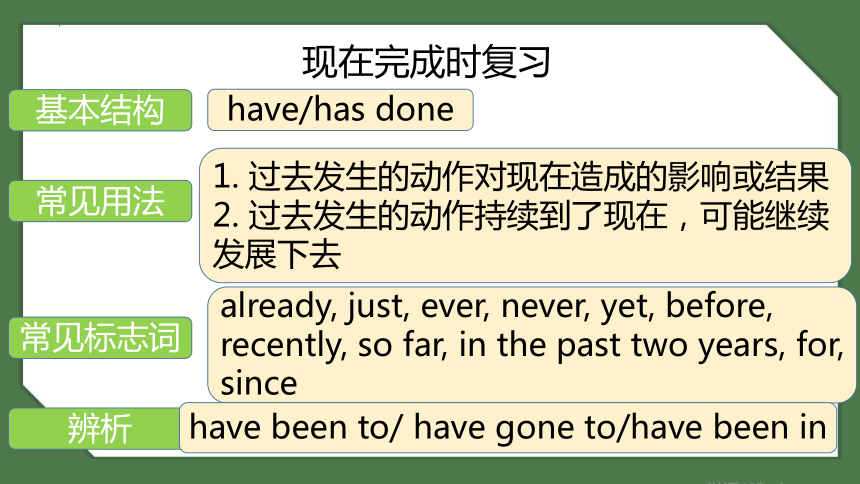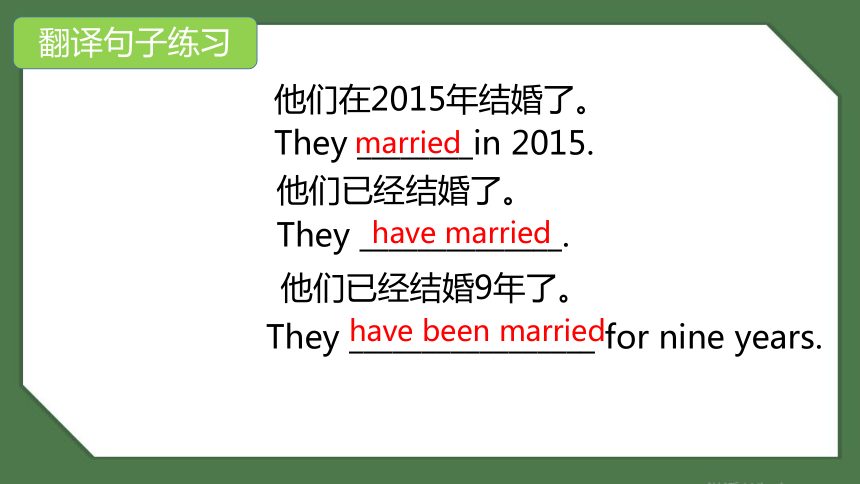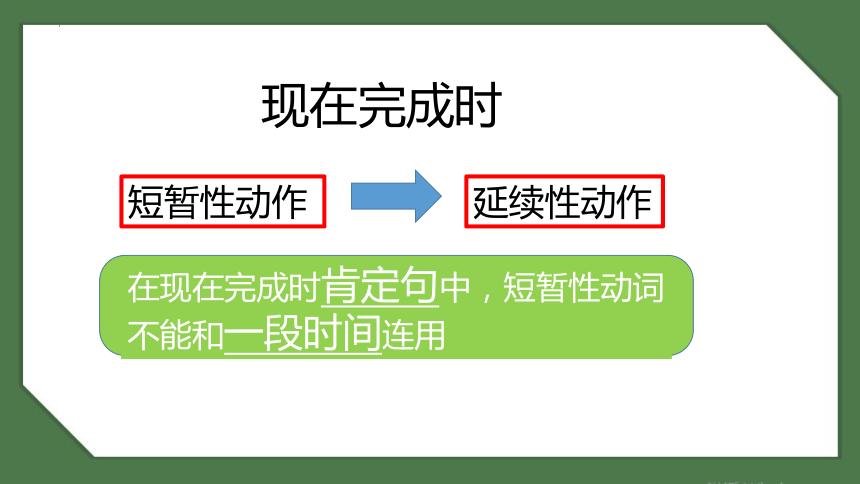Unit 2 Travelling Grammar 现在完成时 课件 2023-2024学年牛津译林版八年级英语下册 (共38张PPT)
文档属性
| 名称 | Unit 2 Travelling Grammar 现在完成时 课件 2023-2024学年牛津译林版八年级英语下册 (共38张PPT) |  | |
| 格式 | pptx | ||
| 文件大小 | 2.2MB | ||
| 资源类型 | 教案 | ||
| 版本资源 | 牛津译林版 | ||
| 科目 | 英语 | ||
| 更新时间 | 2024-02-24 15:30:24 | ||
图片预览












文档简介
(共38张PPT)
短暂性/延续性动词
现在
完成时
现在完成时复习
基本结构
常见用法
常见标志词
辨析
现在完成时复习
基本结构
常见用法
常见标志词
辨析
have/has done
1. 过去发生的动作对现在造成的影响或结果
2. 过去发生的动作持续到了现在,可能继续发展下去
already, just, ever, never, yet, before, recently, so far, in the past two years, for, since
have been to/ have gone to/have been in
Jack买了这辆车。
Jack已经买了这辆车。
Jack ________ the car.
Jack ______________ the car.
Jack已经买了这辆车两天了。
Jack ______________ the car for two days.
翻译句子练习
bought
has bought
has had
他们在2015年结婚了。
他们已经结婚了。
They ________in 2015.
They ______________.
他们已经结婚9年了。
They _________________ for nine years.
翻译句子练习
married
have married
have been married
Moana离开家了。
Moana已经离开家了。
Moana ________ her home.
Moana ___________her home.
Moana自从十年前就离开家了。
Moana ____________________ her home since ten years ago.
翻译句子练习
left
has left
has been away from
Jack ______________ (buy) the car for two days.
They ____________________ (marry) for three years.
Moana ________________________ (leave) her home since ten years ago.
用现在完成时填空
has had
have been married
has been away from
现在完成时
短暂性动作
延续性动作
现在完成时
短暂性动作
延续性动作
在现在完成时肯定句中,短暂性动词不能和一段时间连用
什么时候要变呢?
常见的段时间
since+过去时的句子
since+过去时间点
for+段时间
during+段时间
How long
常见的段时间
for two minutes
during the past three years
since last year
since 1990
since two years ago
since I came here
How long have you been here
since+过去时的句子
since+过去时间点
for+段时间
during+段时间
How long
遇到时间段记得变!
怎么变呢?
短暂性动词变延续性动词
怎么变呢?
短暂性动词 延续性动词 用于现在完成时
buy
borrow
put on
①
短暂性动词变延续性动词
怎么变呢?
短暂性动词 延续性动词 用于现在完成时
buy have have/has had
borrow keep have/has kept
put on wear/be in have/has worn; have/has been in
①
短暂性动词变延续性动词
短暂性动词 延续性动词 用于现在完成时
marry
die
open
close
wake up
怎么变呢?
②
短暂性动词变延续性动词
短暂性动词 延续性动词 用于现在完成时
marry be married have/has been married
die be dead have/has been dead
open be open have/has been open
close be closed have/has been closed
wake up be awake have/has been awake
怎么变呢?
②
短暂性动词变延续性动词
短暂性动词 延续性动词 用于现在完成时
leave
begin/start
finish/stop
come/go /arrive
join
return
怎么变呢?
③
短暂性动词变延续性动词
短暂性动词 延续性动词 用于现在完成时
leave be away have/has been away
begin/start be on have/has been on
finish/stop be over have/has been over
come/go /arrive be at/in have/has been at/in
join be in have/has been in
return be back have/has been back
怎么变呢?
③
He died 10 years ago.
He ________________ for 10 years / since 10 years ago.
2. He borrowed the book 2 weeks ago.
He ____________ the book for 2 weeks.
3. He bought the motorbike a month ago.
He ____________ the motorbike for a month.
4. He arrived here three days ago.
He ____________ here since three days ago.
exercises
短暂性动词和延续性动词之间的转化
has been dead
has kept
has had
has arrived
5. He left here 2 years ago.
He ________________ from here for 2 years.
6. The film began 30 minutes ago.
The film ______________ for 30 minutes.
7. They closed the door an hour ago.
The door __________________ for an hour.
8. He joined the army last year.
He ______________ the army for a year.
exercises
has been away
has been on
has been closed
has been in
1. Mother ________ me a new coat yesterday. I ________ it on. It fits me well.
A. had made; have tried B. made; have tried
C. has made; tried D. made; tried
2. --________ you ________ the text yet
--Yes, we ________ it two hours ago.
A. Did; copy; did B. Have; copied; have
C. Have; copied; did D. Did; copy; had
3. “Why ________ she ________ angry ” “Because he ________ at her just now .”
A. did; get; shouted
B. has; got; shouted
C. did; get; has shouted
D. has; got; has shouted
4. ________ you ________ the film before Where ________ you ________ it
A. Have; seen; did; see B. Did; see; did; watch
C. Have; seen; have; seen D. Did; see; have; seen
5. --Where ________ John ________
--To the library. He ________ there for an hour.
A. has; been; has gone B. has; gone; has been
C. did; go; went D. did; be; went
一般过去时 vs 现在完成时
一般过去时 现在完成时
基本结构
与现在的关系
标志词
一般过去时 vs 现在完成时
一般过去时 现在完成时
基本结构
与现在的关系
标志词
动词过去式(did/was/were)
have/has + done
只描述过去发生的事,与现在无关
1.过去发生的事持续到了现在
2.过去发生的事对现在有影响
3.到目前发生的次数
yesterday, the other day, last…, …ago, in 1990, just now
already, ever, just, recently, yet, so far, up to now, for, since
1.He _____________ (work) in our school for one year.
2.He __________ (come) to our school last year.
3.They _____________ (cook) the supper already.
4.They __________ (cook) the supper half an hour ago.
exercises
填空
have worked
has come
have cooked
cooked
语法总结:
1,出现段时间 短暂性动作 变
延续性动作
常见段时间:
For+一段时间
Since+过去时间点
Since+过去时的句子
How long
During+一段时间
语法总结:
2,短暂性动词 变
延续性动词
buy
borrow
die
leave
begin/start
finish/stop
come/go/arrive
join
return
......
have
keep
dead
be away
be on
be over
be at/in
be in
be back
……
语法总结:
3, 一般过去时 VS 现在完成时
基本结构 did/was/were
标志词 yesterday, …ago
in 1990, just now
last…
have/has done
already, ever, just, recently, yet, so far, up to now, for, since
出门测
Mother ________ me a new coat yesterday. I ________ it on. It fits me well.
A. had made; have tried B. made; have tried
C. has made; tried D. made; tried
2. --________ you ________ the text yet
--Yes, we ________ it two hours ago.
A. Did; copy; did B. Have; copied; have
C. Have; copied; did D. Did; copy; had
3.“Why ________ she ________ angry ”
“Because he ________ at her just now .”
did; get; shouted B. has; got; shouted
C. did; get; has shouted D. has; got; has shouted
4. ________ you ________ the film before Where ________ you ________ it
A. Have; seen; did; see B. Did; see; did; watch
C. Have; seen; have; seen D. Did; see; have; seen
5. -- Where ________ John ________
-- To the library. He ________ there for an hour.
A. has; been; has gone B. has; gone; has been
C. did; go; went D. did; be; went
1. My family moved to Nanjing in 1995.
My family _________ _________ in Nanjing since 1995.
has been
2. He borrowed a novel from the school library two days ago.
He _________ _________a novel form the school library since two days ago.
3. These conferences stopped last Saturday.
These conferences _________ _________ _________ _________ last Saturday.
has kept
have been
ever since
4. We began to learn English three years ago. (改为同义句)
We _________ _________ English since three years ago.
5. They have cleaned the classroom twice this week. (对画线部分提问)
_________ _________ _________ _________ they _________ the classroom this week?
have learnt
How many times have
cleaned
~See You!~
短暂性/延续性动词
现在
完成时
现在完成时复习
基本结构
常见用法
常见标志词
辨析
现在完成时复习
基本结构
常见用法
常见标志词
辨析
have/has done
1. 过去发生的动作对现在造成的影响或结果
2. 过去发生的动作持续到了现在,可能继续发展下去
already, just, ever, never, yet, before, recently, so far, in the past two years, for, since
have been to/ have gone to/have been in
Jack买了这辆车。
Jack已经买了这辆车。
Jack ________ the car.
Jack ______________ the car.
Jack已经买了这辆车两天了。
Jack ______________ the car for two days.
翻译句子练习
bought
has bought
has had
他们在2015年结婚了。
他们已经结婚了。
They ________in 2015.
They ______________.
他们已经结婚9年了。
They _________________ for nine years.
翻译句子练习
married
have married
have been married
Moana离开家了。
Moana已经离开家了。
Moana ________ her home.
Moana ___________her home.
Moana自从十年前就离开家了。
Moana ____________________ her home since ten years ago.
翻译句子练习
left
has left
has been away from
Jack ______________ (buy) the car for two days.
They ____________________ (marry) for three years.
Moana ________________________ (leave) her home since ten years ago.
用现在完成时填空
has had
have been married
has been away from
现在完成时
短暂性动作
延续性动作
现在完成时
短暂性动作
延续性动作
在现在完成时肯定句中,短暂性动词不能和一段时间连用
什么时候要变呢?
常见的段时间
since+过去时的句子
since+过去时间点
for+段时间
during+段时间
How long
常见的段时间
for two minutes
during the past three years
since last year
since 1990
since two years ago
since I came here
How long have you been here
since+过去时的句子
since+过去时间点
for+段时间
during+段时间
How long
遇到时间段记得变!
怎么变呢?
短暂性动词变延续性动词
怎么变呢?
短暂性动词 延续性动词 用于现在完成时
buy
borrow
put on
①
短暂性动词变延续性动词
怎么变呢?
短暂性动词 延续性动词 用于现在完成时
buy have have/has had
borrow keep have/has kept
put on wear/be in have/has worn; have/has been in
①
短暂性动词变延续性动词
短暂性动词 延续性动词 用于现在完成时
marry
die
open
close
wake up
怎么变呢?
②
短暂性动词变延续性动词
短暂性动词 延续性动词 用于现在完成时
marry be married have/has been married
die be dead have/has been dead
open be open have/has been open
close be closed have/has been closed
wake up be awake have/has been awake
怎么变呢?
②
短暂性动词变延续性动词
短暂性动词 延续性动词 用于现在完成时
leave
begin/start
finish/stop
come/go /arrive
join
return
怎么变呢?
③
短暂性动词变延续性动词
短暂性动词 延续性动词 用于现在完成时
leave be away have/has been away
begin/start be on have/has been on
finish/stop be over have/has been over
come/go /arrive be at/in have/has been at/in
join be in have/has been in
return be back have/has been back
怎么变呢?
③
He died 10 years ago.
He ________________ for 10 years / since 10 years ago.
2. He borrowed the book 2 weeks ago.
He ____________ the book for 2 weeks.
3. He bought the motorbike a month ago.
He ____________ the motorbike for a month.
4. He arrived here three days ago.
He ____________ here since three days ago.
exercises
短暂性动词和延续性动词之间的转化
has been dead
has kept
has had
has arrived
5. He left here 2 years ago.
He ________________ from here for 2 years.
6. The film began 30 minutes ago.
The film ______________ for 30 minutes.
7. They closed the door an hour ago.
The door __________________ for an hour.
8. He joined the army last year.
He ______________ the army for a year.
exercises
has been away
has been on
has been closed
has been in
1. Mother ________ me a new coat yesterday. I ________ it on. It fits me well.
A. had made; have tried B. made; have tried
C. has made; tried D. made; tried
2. --________ you ________ the text yet
--Yes, we ________ it two hours ago.
A. Did; copy; did B. Have; copied; have
C. Have; copied; did D. Did; copy; had
3. “Why ________ she ________ angry ” “Because he ________ at her just now .”
A. did; get; shouted
B. has; got; shouted
C. did; get; has shouted
D. has; got; has shouted
4. ________ you ________ the film before Where ________ you ________ it
A. Have; seen; did; see B. Did; see; did; watch
C. Have; seen; have; seen D. Did; see; have; seen
5. --Where ________ John ________
--To the library. He ________ there for an hour.
A. has; been; has gone B. has; gone; has been
C. did; go; went D. did; be; went
一般过去时 vs 现在完成时
一般过去时 现在完成时
基本结构
与现在的关系
标志词
一般过去时 vs 现在完成时
一般过去时 现在完成时
基本结构
与现在的关系
标志词
动词过去式(did/was/were)
have/has + done
只描述过去发生的事,与现在无关
1.过去发生的事持续到了现在
2.过去发生的事对现在有影响
3.到目前发生的次数
yesterday, the other day, last…, …ago, in 1990, just now
already, ever, just, recently, yet, so far, up to now, for, since
1.He _____________ (work) in our school for one year.
2.He __________ (come) to our school last year.
3.They _____________ (cook) the supper already.
4.They __________ (cook) the supper half an hour ago.
exercises
填空
have worked
has come
have cooked
cooked
语法总结:
1,出现段时间 短暂性动作 变
延续性动作
常见段时间:
For+一段时间
Since+过去时间点
Since+过去时的句子
How long
During+一段时间
语法总结:
2,短暂性动词 变
延续性动词
buy
borrow
die
leave
begin/start
finish/stop
come/go/arrive
join
return
......
have
keep
dead
be away
be on
be over
be at/in
be in
be back
……
语法总结:
3, 一般过去时 VS 现在完成时
基本结构 did/was/were
标志词 yesterday, …ago
in 1990, just now
last…
have/has done
already, ever, just, recently, yet, so far, up to now, for, since
出门测
Mother ________ me a new coat yesterday. I ________ it on. It fits me well.
A. had made; have tried B. made; have tried
C. has made; tried D. made; tried
2. --________ you ________ the text yet
--Yes, we ________ it two hours ago.
A. Did; copy; did B. Have; copied; have
C. Have; copied; did D. Did; copy; had
3.“Why ________ she ________ angry ”
“Because he ________ at her just now .”
did; get; shouted B. has; got; shouted
C. did; get; has shouted D. has; got; has shouted
4. ________ you ________ the film before Where ________ you ________ it
A. Have; seen; did; see B. Did; see; did; watch
C. Have; seen; have; seen D. Did; see; have; seen
5. -- Where ________ John ________
-- To the library. He ________ there for an hour.
A. has; been; has gone B. has; gone; has been
C. did; go; went D. did; be; went
1. My family moved to Nanjing in 1995.
My family _________ _________ in Nanjing since 1995.
has been
2. He borrowed a novel from the school library two days ago.
He _________ _________a novel form the school library since two days ago.
3. These conferences stopped last Saturday.
These conferences _________ _________ _________ _________ last Saturday.
has kept
have been
ever since
4. We began to learn English three years ago. (改为同义句)
We _________ _________ English since three years ago.
5. They have cleaned the classroom twice this week. (对画线部分提问)
_________ _________ _________ _________ they _________ the classroom this week?
have learnt
How many times have
cleaned
~See You!~
